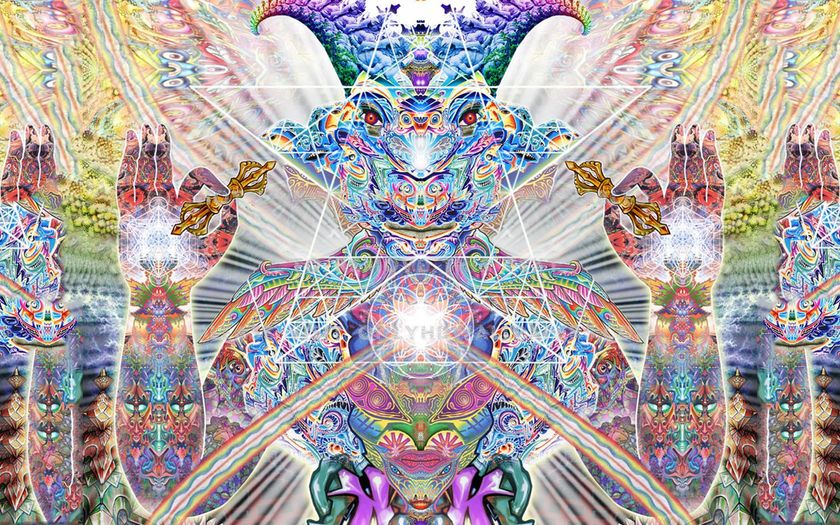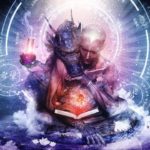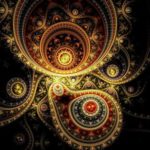**Updated March 2023**
Ayahuasca Tea can affect the brain by introducing DMT (Dimethyltryptamine) which reduces the activity of the Default Mode Network (DMN). DMN is a network of areas of the brain which are highly connected to each other during waking life. It’s possible you can have intense, health promoting, introspective hallucinations as the DMT interacts with your Serotonin Receptors.
Table of Contents:
- How does Ayahuasca effect the brain in detail?
- Long term effects of Ayahuasca?
- What are the psychological effects of Ayahuasca?
- What are the negative health effects of Ayahuasca?
- Related Articles
How does Ayahuasca effect the brain in detail?
Once you have drunk the Ayahuasca Tea, the psychedelic agent, DMT, within it passes into your bloodstream through your stomach and eventually passes the Blood Brain Barrier.
NOTE: Normally the DMT would be ‘intercepted’ in normal food digestion as humans have an enzyme (MAO) in their stomachs which neutralize the effects of psychoactive drugs. We need this because actually DMT is in many different plants and without it we would trip frequently. Part of the Ayahuasca Tea (The Ayahuasca Vine itself) inhibits this enzyme which means that the DMT is not neutralized during digestion and in fact carries onto the brain.
Once in the brain DMT attaches to the Serotonin Receptors (chemically it’s very similar to Serotonin so it attaches here) and effects you in the visionary and psychedelic way.
The Visionary experience is not understood very well (over and above the physical effects of DMT on the brain) by material science and is more the realm of spiritual practices to find explanation and understanding.
TIP: The psychedelic experience can be multi-faceted and unique to you and hence I don’t spend a lot of time trying to describe the visionary experience and effects themselves. You can guide these experiences via intentions, meditation and a Dieta.
After that the DMT causes the brain activity in the Default Mode Network (DMN) to reduce. It is believed that the DMN is the ‘seat’ or ‘home’ of our ego’s (your identity or individual self or ‘unit of consciousness’) and as research shows the brain in this scenario will show reduced brain activity in areas associated with this Default Mode Network.
As such if activity in the DMN is reduced it’s possible to experience ego dissolution. The dissolution of the area of the brain where your ‘self identity’ is controlled from is why we often experience feelings of ‘oneness’ as our psychological barriers are temporarily removed.
You might like to watch these two videos from Michael Pollen and Robin Carhart-Harris which further explain what I have said above.
The former is the author of ‘How to Change Your Mind’ which is a psychedelic book in which he researches them and also takes LSD. He has a nice way of describing psychedelic effects on the brain.
The later is a scientist name Robin Carhart-Harris, and other of his fellow scientists, who did research the affects of psychedelic substances on the brain and describes how neurogenesis (creation of new neurons) is undertaken under the influence of a psychedelic and promotes brain health.
My own thoughts on the effects of psychedelics on the brain:
This ‘reduction of activity’ described above and my Robin in his video is important to understand, not so much because psychedelic compounds act upon your ego but, more so because a psychedelic can reduce the effects of the ego such that ‘other parts’ of the brain can be allowed to operate unhindered by the egos’ influence.
The ‘other part(s)’ could be understood as your ‘true self’ or as some might say your ‘consciousness’. I don’t mean this in the dictionary definition sense but in the spiritual sense. Think Buddhism of Vedic thought not modern Psychology.
When the ego (in the DMN) has its strength diminished then the consciousness is allowed to shine more. In psychedelic communities, these effects are what’s known as ‘The Observer’ as what you find when the DMN is ‘dialed down’ or temporarily ‘dissolved’ is that a part of your psyche is able to observe the other parts as if when they are separated both are adjacent to each other and able to look at the other.
As Aubrey Marcus and Erick Godsey would say, our ‘self’ contains both the ego and the observer. Check out this podcast where they talk about this concept.
Long term affects of Ayahuasca?
Ego dissolution:
I find it quite hard to describe the effects of Ego Dissolution to people but, I will try. The basic premise is that by achieving Ego Dissolution then you are able to step out of your own ‘perception of yourself’ and observe it from an arms distance. This detachment from your ‘self’ is what is called being The Observer and is not something that material science, believing consciousness emanates from the physical brain, .
This alone is often not understandable to people who have not experienced the effects of ego dissolution however, and so I will attempt to talk in depth about a particular example from my own experiences of ego dissolution in the below sections. Read on.
What are the psychological effects of Ayahuasca?
Is Ayahuasca good for Anxiety:
I have a high level of anxiety (top 6th percentile by some metrics). It is characterized by a profound lack of confidence and sometimes an inability to make decisions.
By allowing some ego dissolution into your life you introduce the ability to conceptually ‘stand outside the self’ and observe your mind (mind being not the same as brain but rather the parts of your psyche which are conscious) undergoing bouts of anxiety. As such you can more objectively see the situation and importantly are also more easily able to drag yourself out of the anxiety. In my case, I can more easily recognize patterns and break their negative spiral more quickly avoiding a drawn out anxiety and possible depression.
Another way to say this is that the effects of ego dissolution gives me an 10,000 foot view of myself. I can see all the pieces and how they relate to one another and hence can understand it as a whole instead of being on the ground and not being able to see the forrest for the trees.
While my anxiety has not decreased over the long term in an absolute sense. In fact it has probably increased I am more able to cope with anxiety and hence the effects were similar to ‘reducing anxiety’. It no longer impacts on my psyche as it used to and has provided me a great deal of positive health aspects both mental and physical.
Understanding the nature of the ego:
Importantly, the ego, as I mentioned, is involved with ideas around your identity. When you are ‘in’ your ego as opposed to being beside it you are consumed by the issue and you feel as if it is all of you, as if it defines you completely.
When you are an arms length from it you can understand that you are not only made up of the ideas and concepts that your ego has about you. If you were you wouldn’t be able to stand beside and observe those ideas and concepts. Having this kind of perspective to look over at your ego makes you understand that you are not defined solely by it. Somewhere during this process I also understood that your ego is able to be manipulated in certain ways with the aim of reducing anxious thought patterns.
I believe my anxiety was formed over time, not given to me at birth in a ready made state and it is my belief that if I learned something then I can also un-learn it.
Whether or not you can completely un-learn the anxiety or not is not necessarily what I’m saying and in fact is not necessary. But you do have to be able to see it for what it is.
One of the things Freud reported about the ego is that it is a kind of mediator between your true self and the world itself. I think that over time my ego learned (perhaps ‘reacted’ or ‘formed’ is a better word) to have these anxious thought patterns through my environment as I grew up.
I find that the ego is in part, just as Freud described, a kind of navigator of our true selves in the world. As it goes along it is influenced by the experiences we have in the world and is ‘engrained’ with the resultant patterns.
I also think that these patterns, once formed, are hard to overcome. Like water traveling down a hill our thoughts follow the path of least resistance. As such, once a negative thought pattern has been created it’s more likely to be reinforced in the future by future thoughts.
The ego seems to have a ruminating nature. It tends to bring up old incidents or reminders of things frequently. In this way, a negative experience can be brought up over and over again to your ego and reinforce this pattern. It is my opinion that one of the things an ego is for is to help you navigate the world. As such reminding you of things in which you found danger in in the past may be a way of avoiding it in the future.
Under these circumstances, being able to stand beside your ego and not be ‘in it’ allows you to see the ego for what it really is. That being, that it is not the entirety of you but, just one part of your psyche. Understanding it’s programable and reinforceable nature means that you can start to create new habits and thoughts and if you are able to reinforce them over time they can become stronger and stronger. I think that you can rewrite neural pathways this way and increase brain health.
What are the negative health effects of Ayahuasca?
TIP: Read the full Ayahuasca preparation guide to see how to drink safely and effectively while minimizing side effects.
Can Ayahuasca make depression worse?
Some people do report Ayahuasca making depression and mental health worse. From my anecdotal research in the Ayahuasca Reddit group (where Ayahuasca users talk about all things Ayahuasca) there are two scenarios possible where you mental health could suffer post Ayahuasca.
Scenario 1: The insights from your ceremonies make some people realize and dwell upon certain lifestyle changes which they are finding difficult to implement. For example, one might go to ceremony and are shown in your ceremonial visions and insights that you have mistreated your body with alcohol (or food or drugs or lack of exercise or whatever) but when you return home you realize that all your friends support the habit you now feel as if you shouldn’t partake in. You start to dwell over the problem because you continued to drink but after some time realize you need to stop seeing your drinking friends and instead start exercising and treating yourself better physically. But it takes several months for you to do this and during this time your anxiety of the issue grows and you sometimes feel depressed as you have not really made the transition to the new lifestyle that you need to. In this scenario some reported that their anxiety, depression or health generally has increased post drinking Ayahuasca although there is an obvious way out.
Scenario 2: Some people have an un-diagnosed psychosis and drink a significant amount of Ayahuasca. If a psychosis either runs in your immediate family or you have a history of personal psychosis (bi-polar, schizophrenia for example) then you need to be very careful with Ayahuasca and any other psychedelic. Best practice is that you should not take a psychedelic substance at all.
Every now and then someone will drink Ayahuasca who matches this psychological profile and the Ayahuasca triggers a psychological break. The break itself can cause depression and an inability to be productive in general which would constitute a significant decrease in mental health. I wrote more about how to deal with a psychedelic psychological break.
Ayahuasca (DMT) and Serotonin Syndrome:
Once you have drunk Ayahuasca the DMT (psychedelic ingredient of the Ayahuasca Tea) contained within the tea passes to your brain from your stomach via the blood stream. After passing the Blood Brain Barrier it attaches to the brain’s Serotonin Receptors and it is thought that it then reduces the ‘dominance’ of the Default Mode Network and starts to increase connections (neurogenesis) in other parts of the brain. We have covered this in detail above.
In the brain Serotonin Syndrome is when these receptors are ‘over loaded’. If you are taking anti-depressants while also drinking Ayahuasca then you can experience Serotonin Syndrome because both the DMT and the anti-depressants are both working upon the receptors in your brain at he same time leading to them being over loaded.
In this way, Ayahuasca and anti-depressants DO NOT mix and you should not do Ayahuasca if you are currently on or have recently gone off of anti-depressants. It is possible to stop taking the anti-depressants and let them leave your system before drinking Ayahuasca but this can take weeks and should be understood with the help of your doctor.
So, how long to be off antidepressants before Ayahuasca?
You should consult your doctor to ask about the half life of your anti-depressants. Failing that you should look up your anti-depressants medication (and any other medications you are on) and look for the ‘half life’ time period and this is more or less how long you would have to go off of the drug BEFORE drinking Ayahuasca so that it is not in your system at the time of drinking.
NOTE: Ideally you are not on any medications while you drink Ayahuasca. Anti-depressants are not the only drug to avoid while drinking Ayahuasca. Please consult your doctor about any medications you are taking and tell them you are planning on drinking Ayahuasca. to optimize your health during the preparation process.
Related Articles:
- You might like to learn about Ayahuasca Deaths also. The short answer is that people do not die from the Ayahuasca Tea itself as it isn’t toxic but some people have died in circumstantial events in and around an Ayahuasca ceremony and some who haven’t taken head of the need to be off medications prior to drinking Ayahuasca.
- It’s also important to learn what the dangers of Ayahuasca are like Serotonin Syndrome in the brain, choosing a good retreat and shaman and preparing well with an Ayahuasca Diet amongst other things.



